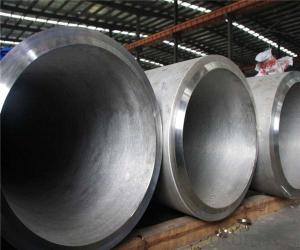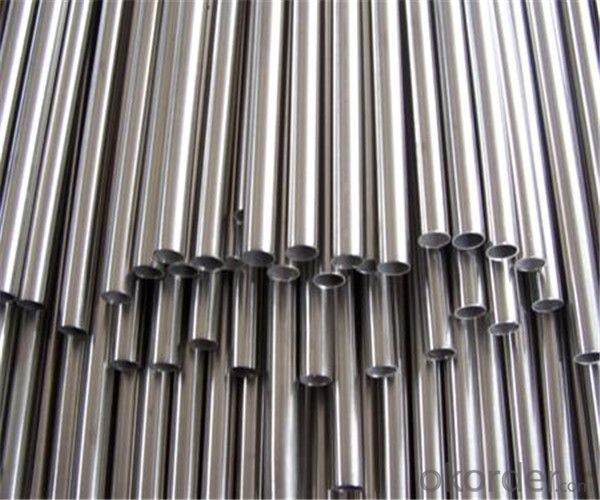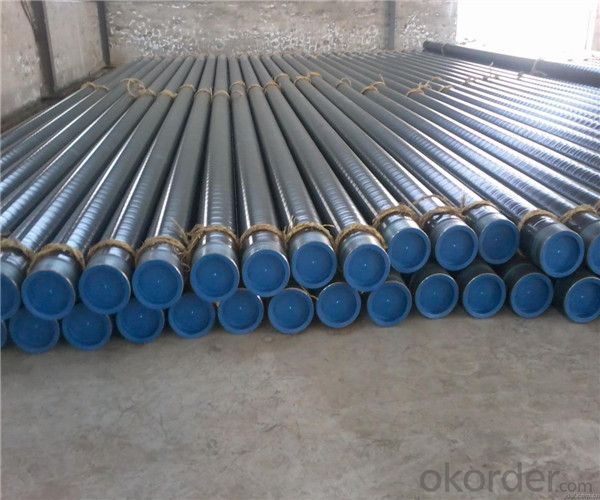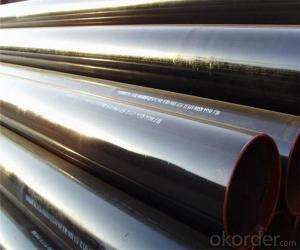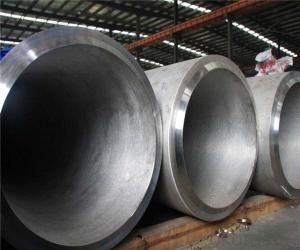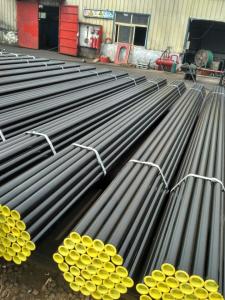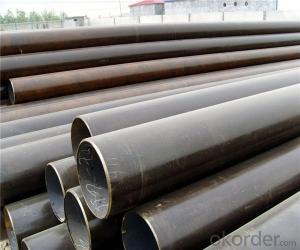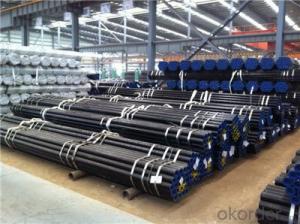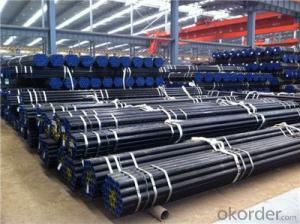High Quality Seamless Steel Pipe with Best Price from CNBM International Group
- Loading Port:
- Tianjin
- Payment Terms:
- TT OR LC
- Min Order Qty:
- 100 m.t.
- Supply Capability:
- 200000 m.t./month
OKorder Service Pledge
OKorder Financial Service
You Might Also Like
PRODUCT DETAILS
1.Structure of Seamless Steel Pipe Description:
A large amount of Seamless Steel Pipes is offered to the clients at cost effective rates. These pipes are extremely durable, resistant to corrosion and have high tensile strength. Our pipes are used in nuclear plants, power plants, refineries and construction industry across the country. Furthermore, we are capable of providing these seamless pipes to the clients in bulk quantity.
2.Main Features of the Steel Pipe:
• High manufacturing accuracy
• High strength
• Small inertia resistance
• Strong heat dissipation ability
• Good visual effect
•Reasonable price
3.Packaging & Delivery:
| Packaging Details: | Seaworthy packages, bundles wrapped with strong steel strip |
| Delivery Detail: | 15-30 days after received 30% TT |
4.Seamless Steel Pipe Specification:
| Standard: | GB, DIN, ASTM,ASME, ASTM A106-2006, ASTM A53-2007 |
| Grade: | 10#,20#, 45#, 16Mn |
Thickness: | 8 - 33 mm |
| Section Shape: | Round |
| Outer Diameter: | 133 - 219 mm |
| Place of Origin: | Shandong, China (Mainland) |
| Secondary Or Not: | Non-secondary |
| Application: | Hydraulic Pipe |
| Technique: | Cold Drawn |
| Certification: | API |
| Surface Treatment: | factory state or painted black |
| Special Pipe: | API Pipe |
| Alloy Or Not: | Non-alloy |
| Length: | 5-12M |
| Outer Diameter: | 21.3-610mm |
5.Product pictures
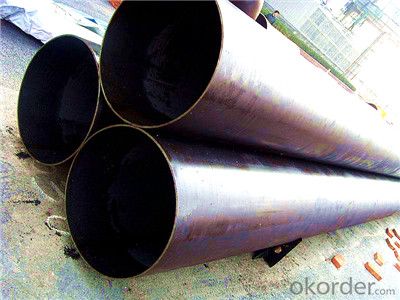
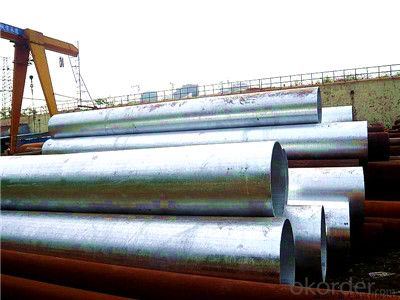
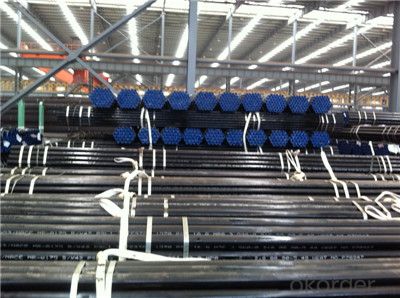
5.FAQ of Seamless steel pipe:
①How is the quality of your products?
Our products are manufactured strictly according to national and internaional standard, and we take a test
on every pipe before delivered out. If you want see our quality certifications and all kinds of testing report, please just ask us for it.
Guaranteed: If products’ quality don’t accord to discription as we give or the promise before you place order, we promise 100% refund.
②How about price?
Yes, we are factory and be able to give you lowest price below market one, and we have a policy that “ for saving time and absolutely honest business attitude, we quote as lowest as possible for any customer, and discount can be given according to quantity”,if you like bargain and factory price is not low enough as you think, just don’t waste your time.Please trust the quotation we would give you, it is professional one.
③Why should you chose us?
Chose happens because of quality, then price, We can give you both.Additionally, we can also offer professional products inquiry, products knowledge train(for agents), smooth goods delivery, exellent customer solution proposals.Our service formula: good quality+good price+good service=customer’s trust.
SGS test is available, customer inspection before shipping is welcome, third party inspection is no problem.
Any question, pls feel free to contact us !
- Q: Can steel pipes be used for wastewater disposal?
- Yes, steel pipes can be used for wastewater disposal. Steel pipes are commonly used in wastewater systems due to their durability, strength, and resistance to corrosion. They can handle the high pressure and flow rates often associated with wastewater and can effectively transport it to treatment plants or other disposal points. Additionally, steel pipes can be coated or lined with materials that provide extra protection against corrosion or chemical reactions with the wastewater, further increasing their longevity and effectiveness in wastewater disposal.
- Q: How are steel pipes connected to other plumbing components?
- Steel pipes are commonly connected to other plumbing components through various methods, depending on the specific application and requirements. The most common methods of connecting steel pipes to other plumbing components include threading, welding, and using mechanical fittings. Threading is a process where the ends of the steel pipes are cut and grooves are created on the outer surface to form a threaded connection. This allows the pipes to be screwed into fittings such as elbows, tees, or couplings. Threaded connections are often used in smaller diameter pipes and low-pressure applications. Welding is another commonly used method to connect steel pipes. It involves heating the ends of the pipes and joining them together by melting the metal at the point of contact. This creates a strong and permanent connection. Welded connections are often used in larger diameter pipes and high-pressure applications. Mechanical fittings are another popular option for connecting steel pipes. These fittings are designed to be easily installed without the need for welding or threading. They typically consist of two parts – a compression ring and a nut. The compression ring is placed over the pipe, and the nut is tightened, compressing the ring onto the pipe and creating a secure connection. Mechanical fittings are commonly used in both residential and commercial plumbing systems. In addition to these methods, other connection techniques such as flanges, grooved couplings, and soldering can also be used to connect steel pipes to other plumbing components, depending on the specific needs of the system. Overall, the method used to connect steel pipes to other plumbing components depends on factors such as the size of the pipes, the pressure of the system, the type of fluid being transported, and the specific requirements of the project. It is important to choose the appropriate method and ensure that the connections are properly installed to ensure the integrity and efficiency of the plumbing system.
- Q: What does "DN25 PN16" mean?
- PN said the pressure is, PN16 is the pipe can withstand 16MPa general meaning, namely, an 16 kg.
- Q: How are steel pipes used in the manufacturing of sewage treatment plants?
- Steel pipes are commonly used in the manufacturing of sewage treatment plants for various purposes such as conveying wastewater, transporting chemicals and gases, and facilitating the distribution of treated water. They provide durability, corrosion resistance, and structural stability necessary for the efficient and reliable operation of sewage treatment processes.
- Q: How do steel pipes handle expansion and contraction?
- Steel pipes handle expansion and contraction by allowing the material to expand and contract freely due to their inherent flexibility and elasticity. This prevents the pipes from experiencing excessive stress or damage, ensuring their durability and structural integrity.
- Q: What are the different wall thicknesses available for steel pipes?
- Steel pipes are available in various wall thicknesses to meet specific requirements and applications. Different schedules indicate the wall thickness. The most commonly used wall thicknesses for steel pipes are Schedule 40, Schedule 80, and Schedule 160. Schedule 40 pipes have a medium wall thickness and are commonly used for general-purpose applications, like conveying fluids and gases. They are suitable for low-pressure systems and widely used in plumbing, HVAC, and irrigation systems. Schedule 80 pipes have a thicker wall compared to Schedule 40 and are designed for high-pressure applications. They are commonly used in industrial settings, oil and gas pipelines, and high-pressure fluid transport systems. The increased wall thickness ensures higher strength and durability to withstand pressure. Schedule 160 pipes have the thickest wall among the available options. They are designed for extremely high-pressure applications, such as refineries, chemical plants, and power generation facilities. These pipes offer exceptional strength and can handle intense pressure and stress in industrial environments. In addition to standard schedules, there are other wall thicknesses available for specific purposes. For instance, extra-strong (XS) pipes have a thicker wall than Schedule 80 pipes and are used for applications requiring even higher pressure resistance. It is crucial to consult professionals or refer to industry standards to determine the appropriate wall thickness for a specific application. Factors like fluid or gas pressure, temperature, and environmental conditions should be considered when selecting the suitable steel pipe with the desired wall thickness.
- Q: How are steel pipes used in structural applications?
- Steel pipes are commonly used in structural applications due to their strength, durability, and versatility. They are often used as columns, beams, and braces in buildings, bridges, and other structures. Steel pipes provide excellent load-bearing capacity and can withstand high levels of stress and pressure, making them ideal for supporting heavy loads. Additionally, their hollow cylindrical shape allows for easy installation and provides space for utilities such as electrical wiring or plumbing. Overall, steel pipes contribute to the stability and integrity of structures, ensuring their safety and longevity.
- Q: How do you calculate the pipe flow velocity for steel pipes?
- To calculate the pipe flow velocity for steel pipes, you can use the formula: Velocity = (Flow rate / (π * (Diameter/2)^2)). This equation takes into account the flow rate of the fluid through the pipe and the diameter of the steel pipe.
- Q: What are the different types of steel pipe supports for seismic applications?
- There are several types of steel pipe supports used for seismic applications, including rigid supports, sway braces, and spring hangers. Rigid supports provide fixed support to the piping system, while sway braces are designed to absorb and redirect seismic energy. Spring hangers, on the other hand, are used to isolate and dampen vibrations caused by seismic activity. These different types of supports are selected based on the specific requirements and characteristics of the piping system and the seismic zone in which it is located.
- Q: What is the fire rating of steel pipes?
- The fire rating of steel pipes depends on several factors. Steel is inherently fire-resistant due to its high melting point and low thermal conductivity. However, the fire rating of steel pipes can be further enhanced through the use of fire-resistant coatings or insulation materials. These additional measures can provide varying degrees of fire protection, typically measured in terms of the duration the pipes can maintain their structural integrity in a fire scenario. The specific fire rating of steel pipes can vary depending on the thickness and type of coating or insulation used. It is important to consult industry standards, such as those set by organizations like the National Fire Protection Association (NFPA), or consult with fire safety professionals to determine the appropriate fire rating requirements for specific applications.
Send your message to us
High Quality Seamless Steel Pipe with Best Price from CNBM International Group
- Loading Port:
- Tianjin
- Payment Terms:
- TT OR LC
- Min Order Qty:
- 100 m.t.
- Supply Capability:
- 200000 m.t./month
OKorder Service Pledge
OKorder Financial Service
Similar products
Hot products
Hot Searches
Related keywords
